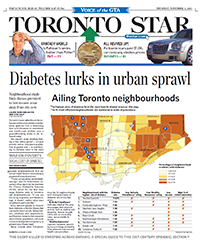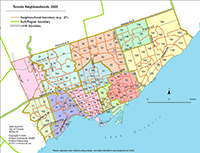The startling results of our Diabetes Atlas, developed with ICES, received widespread media attention, including an interactive website launched by the Toronto Star. The findings informed the Ontario Ministry of Health and Long-Term Care’s 2008 Chronic Disease Management Strategy, and was immediately recognized by the City of Toronto, the Toronto Transit Commission (TTC) and the provincial government as an important guide for policy decision-making. Follow-up research included the Peel Diabetes Atlas and Healthy Development Index.
Category: MAP history
Research impact: CDC adopts universal HIV screening recommendations
Recommendations we developed with Stanford University and Duke University were adopted by the U.S. Centres for Disease Control (CDC) to expand HIV screening for all patients 13-64 years in all health care settings. Our economic analysis showed that routine HIV screening for everyone was cost effective and a good use of health care resources, even where prevalence of HIV is low.
Research impact: A paradigm shift in homelessness and health
We published one of the first-ever papers in a general medical journal describing the links between homelessness, housing and health. The paper was widely recognized as groundbreaking – changing the conversation about homelessness and housing worldwide. It has since been cited in more than 1000 academic publications. In 2014, we published a follow-up to the article, this time in the world’s highest-impact general medical journal: the Lancet. It focused on reviewing evidence-based solutions, and highlighted Housing First as a proven approach to end chronic homelessness.
Research impact: Empowering community orgs and policy makers with the data they need
We founded Toronto Community Health Profiles Partnership (TCHPP) to fill an important knowledge gap: community organizations and health and social services providers had little access to urgently-needed, community-level, demographic, socioeconomic, and population health information about the areas and populations they served. In 2005, TCHPP expanded to become Ontario Community Health Profiles Partnership, a publicly accessible, searchable health database and service that many health and community organizations across the province today depend on to help plan and evaluate their programs.
MAP celebrates 25 years
MAP is world-leading research centre dedicated to creating a healthier future for all. We are a team of 60 scientists, investigators and postdoctoral fellows and more than 160 staff and students. We are home to six prestigious Canada Research Chairs and more than $100M in active studies. For 25 years we have been central to St. Michael’s mission to serve the disadvantaged and we are proud to remain based in the Li Ka Shing Knowledge Institute at St. Michael’s Hospital, now a site of Unity Health Toronto.
MAP hosts second Solutions for Healthy Cities Symposium
On March 23, 2023, MAP hosted the second Solutions for Healthy Cities Symposium in Toronto. Almost 200 researchers, service providers, policymakers, students and community experts gathered to explore and discuss this year’s theme: the science and practice of implementation success.
A transformative partnership with Staples Canada
Staples and MAP announced a first-of-its-kind partnership called Even the Odds, a three-year, $3-million commitment to raise awareness of inequity in Canada and fund the development of MAP’s program and policy solutions. The partnership has since been extended to five years, and has surpassed its campaign goals thanks to the commitment and support of Staples’ customers, associates, and vendor-partners as well as corporate match donations.
MAP hosts first Solutions for Healthy Cities Symposium
MAP launched 10 national, collaborative solutions networks with a common goal: to effect real-world social change by co-designing and demonstrating what works to address critical urban health challenges in our communities. On March 2-3 2020, just days before the COVID-19 pandemic was declared, MAP hosted a symposium in Toronto that brought together more than 170 network members from across the country: scientists, community partners, policy makers, and people with lived expertise.
Brand launch: MAP
To support an ambitious fundraising campaign, the centre updated its brand with the addition of “MAP” to its name, “Centre for Urban Health Solutions.” Why MAP? It’s not an acronym. Instead, it represents our vision and our purpose. Together with our community and policy partners, we are charting the way to a healthier future for all.
The Centre grows to a team of 20 scientists
With refreshed strategic positioning, the centre grows to a team of 20 multidisciplinary scientists managing $30M in health equity research projects.





